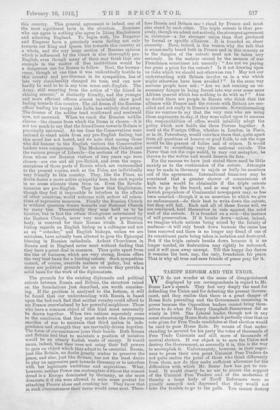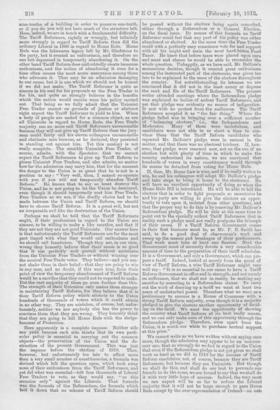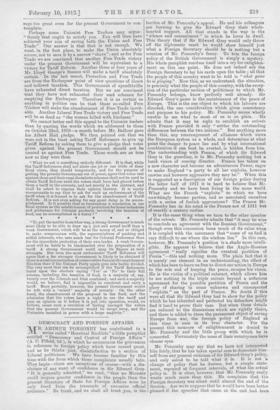TARIFF REFORM AND THE UNION.
WE do not wonder at the sense of disappointment displayed by our correspondents in regard to Mr. Bonar Law 'fl speech. They feel very deeply the need for defending the Union and for defeating the present Govern- ment, and they realize that there is a great danger of Home Rule prevailing and the Government remaining in power because the Opposition leaders cannot bring them- selves to do what Sir Henry Campbell-Bannerman did so wisely in 190G. The Liberal leader, though not in any sense abandoning Home Rule, made it perfectly clear that no vote given for Free Trade candidates at that election would be used to pass Home Rule. By means of that under- standing he secured for his party the votes of thousands of Free Trade Unionists and still more of thousands of neutral electors. If our object is to save the Union and destroy the Government, as assuredly it is, this is the way to accomplish it. Unfortunately, however, in their eager- ness to press their own point Unionist Free Traders do not quite realize the point of those who think differently from them, nor do they make sufficient allowance for the difficulties with which Mr. Bonar Law has got to con- tend. It would clearly be no use to secure the support of the Unionist Free Traders and of the moderates if thereby a large body of Tariff Reformers. were so greatly annoyed and depressed that they would not take the trouble to go to the polls. You cannot destroy nine-tenths of a building in order to preserve one-tenth, or if you do you will not have much of the structure left. Here, indeed, we are in touch with a, fundamental difficulty. The Tariff Reformers, rightly or wrongly, feel infinitely more strongly in regard to Tariff Reform than did the ordinary Liberal in 1906 in regard to Home Rule. Homo Rule was the lukewarm legacy left by Mr. Gladstone to the party, but it created no enthusiasm, and therefore no one felt depressed in temporarily abandoning it. On the other hand Tariff Reform does undoubtedly create immense enthusiasm, and the notion of abandoning it even for a time often causes the most acute annoyance among those who advocate it. That may be an admission damaging to our cause, but it is one which we should not be honest if we did not make. The Tariff Reformer is quite as sincere in his zeal for his proposals as the Free Trader is for his, and quite as strongly believes in the benefits which the nation would receive were his policy carried out. That being so we fully admit that the Unionist Free Trader cannot on grounds of justice or abstract right expect the Tariff Reformer to yield to him. When a body of people are united for a common object, as are all Unionists in regard to Home Rule, the Free Trade majority can no more call Tariff Reformers unreasonable because they will not give up Tariff Reform than the jury- man could fairly call his eleven colleagues unreasonable and obstinate men because, as he declared, they persisted in standing out against him. Yet this analogy is not really complete. The sensible Unionist Free Trader, of course, admits, with the Spectator, that we cannot expect the Tariff Reformers to give up Tariff Reform to please Unionist Free Traders, and also admits, no matter how far the admission may carry him, that for the moment the danger to the Union is so great that he is not in a position to say : "Very well, then, I cannot co-operate with you if you will not temporarily abandon Tariff Reform." He knows that to say so must destroy the Union, and he is not going to let the Union be destroyed, even though it should temporarily cost him Free Trade. Free Traders as we are, if the deadly choice had to be made between the Union and Tariff Reform, we should have to choose Tariff Reform. It is a great evil, but not an irreparable evil like the destruction of the Union.
Perhaps we shall be told that the Tariff Reformers ought, if their professions in regard to the Union are sincere, to be willing to make a like sacrifice, and that if they are not they are not good Unionists. Our answer hero is that unfortunately the Tariff Reformers are for the most part tinged with what they would call enthusiasm and we should call fanaticism. Though they are, in our view, wrong they honestly believe that their cause is so good that it can perfectly well prevail without assistance from the Unionist Free Traders or without winning over the neutral Free Trade votes. They believe—and you can- not shake them in their belief—that they are going to win in any ease, and no doubt, if this were true, from their point of view the temporary abandonment of Tariff Reform would be a sacrifice that they could not be expected to make. • But the vast majority of them go even further than this. The strength of their Unionism only makes them stronger in maintaining Tariff Reform, for they believe that it is their Tariff Reform policy which attracts to the Union hundreds of thousands of voters which it could obtain in no other way. They are mistaken, of course, but, unfor- tunately, neither we or anybody else has the power to convince them that they are wrong. They honestly think that they are going to kill Home Rule with the sledge- hammer of Protection.
Here apparently is a complete impasse. Neither side can yield because each side thinks that its own parti- cular policy is essential to carrying out the common objects—the preservation of the Union and the de- struction of the present Government. This was just the impasse before the election of 1910. Then, however, but unfortunately too late to affect more than a very small number of constituencies, a formula was devised which left tho question open, which took away none of their enthusiasm from the Tariff Reformers, and yet did what was essential—left free thousands of Liberal Free Traders to vote, as they would say, "on this occasion only" against the Liberals. That formula was the formula of the Referendum, the formula which laid it down that no scheme of Tariff Reform should be passed without the electors being again consulted, either through a Referendum or a General Election, on the fiscal issue. By means of this formula no Tariff Reformer could feel that any part of his policy was either abandoned or shelved. At the same time the Free Trader could with a perfectly easy conscience vote for and support with all his might and main the most hard-bitten Food Taxer. He knew that before taxes were placed upon corn and meat and, cheese he would be able to reconsider the whole question. Unhappily, as we have said, Mr. Balfour's momentous decision, though it created great enthusiasm among the instructed part of the electorate, was given too late to be explained to the mass of the electors throughout the country. Yet notwithstanding its lateness we are convinced that it did not in the least annoy or depress the rank and file of the Tariff Reformers. The present writer attended meetings whore the Referendum pledge was explained to bodies of ardent Tariff Reformers, and yet that pledge was evidently no source of indignation. It met with no protest from the audiences. The Tariff Reformers accepted it as "the fair thing." Where the pledge failed was in 'bringing over a sufficient number of "balancing electors," i.e., the Independents and Moderates. -Many of them were incredulous, and candidates were not able in so short a time to con- vince them that the Tariff Reform candidates who repeated Mr. Balfour's pledge were in earnest in the matter, and that there was no electoral trickery. If, how- ever, that pledge were renewed now, not on the eve of an election but with plenty of time in which to make the country understand its nature, we are convinced that hundreds of voters in every constituency would through its means be detached from voting for Home Rule.
If, then, Mr. Boma. Law is wise, and if he really wishes to win, he and his colleagues will adopt Mr. Balfour's pledge and take steps to bring it home to the electorate. He will have an excellent opportunity of doing so when the Home Rule Bill is introduced. He will be able to tell the electors that in order to fight proposals so monstrous he and his party are willing to give the electors an oppor- tunity to vote upon it, isolated from other questions, and that the proper way to do this is by renewing Mr. Balfour's Referendum pledge. He will be able at the same time to point out to the specially ardent Tariff Reformers that in reality such a pledge need. not really postpone the triumph of their cause. If a Tariff Reform Government comes in their first business must be, as Mr. F. E. Smith has said, to do a good deal of charwoman's work and sweep up the messes and breakages of their predecessors. That work must take at least one Session. Next the Government must of necessity devote a very considerable amount of time to the preparation of their tariff schedules. It is a Government, and only a Government, which can pre- pare a tariff. Indeed, looked at merely from the point of view of Tariff Reform, a wise Tariff Reformer might very well say : "It is so essential to our cause to have a Tariff Reform Government in office and in strength, and not merely on sufferance, that we shall not in reality be making any sacrifice by assenting to a Referendum clause. To carry out the work of drawing up a tariff we want at least two years of undisturbed power. Therefore what we want as a preliminary to success is a House of Commons with a strong Tariff Reform majority, even though it is a majority pledged to give the electors another opportunity of decid- ing on the tariff. We want the opportunity of showing the country what Tariff Reform at its best really means, and we can only make sure of this opportunity through the Referendum pledge. Therefore, even apart from the Union, it is worth our while to purchase neutral support at this price."
We cannot write as .we. have written without saying once more, though the admission may appear to be an unneces- sary one, that so strongly do we feel in regard to the Union that even if the Referendum pledge is not got given we shall work as hard as we did in 1910 for the success of Tariff Reform candidates, not, of course, because they are Tariff Reformers, but because they are Unionists. But though we shall do this, and shall do our best to persuade our friends to do the same, we are bound to say that we shall do it with very little hope of success. Indeed, the very most we can expect will be so far to reduce the Liberal majority that it will not be largo enough to pass Home Rule except by the over-representation of Ireland—an outs rage too great even for the present Government to con- template. Perhaps some Unionist Free Traders may argue: " Surely that ought to satisfy you. You will then have achieved your aim of saving both the Union and Free Trade." bur answer is that that is not enough. We want, in the first place, to make the Union absolutely secure, not to save it by a narrow "shave"; and as for Free Trade we are convinced that another Free Trade victory under the present Government will be equivalent to a victory for Tariff Reform. Another three or four years of Mr. Lloyd George's finance will make a tariff absolutely certain. In the last resort, Protection and Free Trade are from the Exchequer point of view questions of direct and indirect taxation. This Government of spendthrifts have exhausted direct taxation. But we are convinced that they have not exhausted their mad schemes for emptying the Exchequer. Therefore it is as certain as anything in polities can be that these so-called Free Traders will make the abandonment of Free Trade inevit- able. Another Liberal Free Trade victory and Free Trade will be as dead as "the woman killed with kindness."
We cannot better end this appeal to the Unionist leaders than by quoting the words which we addressed to them on October 22nd, 1910—a month before Mr. Balfour gave his Albert Hall pledge. We then pointed out that we were not in the least asking Tariff Reformers to give up Tariff Reform by asking them to give a pledge that votes given against the present Government should not be treated. as against Free Trade. These words are as true now as they were then.
"What we ask is something entirely different. It is that, while the Tariff Reformers shall not abate one jot or one tittle of their fiscal views, they should temporarily, and for the purpose of getting the present Government out of power, agree that votes cast against them and their semi-Socialistic schemes shall not be used to obtain Tariff Reform until the voters shall have had placed before them a tariff in the concrete, and not merely in the abstract, and shall be asked to express their opinion thereon. It is surely unreasonable to say that to ask for such an endorsement of the tariff when it is framed is to ask for the abandonment of Tariff Reform. It is not even asking for any great delay in its accom- plishment. Is it possible that so tremendous a revolution in our fiscal system as the establishment of protection for home industries and preference for Colonial products, involving the taxation of food, can be accomplished in a hurry P "
•
"To put the matter in another way, a strong Government is much more likely to be able to draw up a just and sound tariff than a weak Government, which will be at the mercy of, and so obliged to make compromises with, the representatives of pushing and selfish interests, who care much less for Colonial Preference than for the immediate protection of their own trades. A weak Govern- ment will be liable to be blackmailed over the preparation of a tariff. A strong Government could snap its fingers at such attempts. But even the most enthusiastic Tariff Reformer will agree that a far stronger Government is likely to be obtained if there is a real concentration of conservative force at tho next General Election than if the Unionst Party again goos into battle divided. The very most that can be accomplished if the Tariff Reformers insist upon the electors saying 'Yes' or 'No' to their full scheme, including the taxation of food, is a majority of, say, twenty over the Liberals and Irish combined ; and such a majority would, we believe, find it impossible to construct and carry a tariff. More probably, however, the present Government would be left with a 'mixed' majority of seventy. On the other band, the abandonment of the proposal to tax food, and the
admission that the voters have a right to see the tariff and pass an opinion on it before it is put into operation, would, we believe, cause such a revulsion of feeling amongst the voters that the present Government would be swept away, and the Unionists installed in power with a large majority."












































 Previous page
Previous page